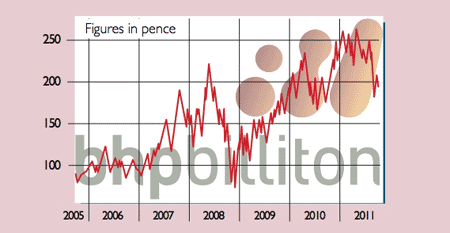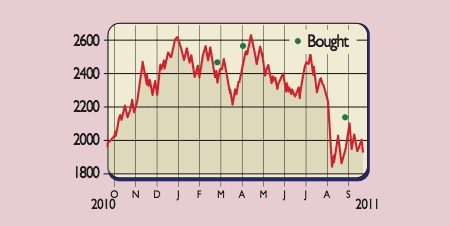Shares in focus: Natural resources giant BHP Billiton
Mining giant BHP Billiton looks strong, but profits are sensitive to world economic growth. So should you buy shares in BHP Billiton now? Phil Oakley investigates.
Get the latest financial news, insights and expert analysis from our award-winning MoneyWeek team, to help you understand what really matters when it comes to your finances.
You are now subscribed
Your newsletter sign-up was successful
Want to add more newsletters?

Twice daily
MoneyWeek
Get the latest financial news, insights and expert analysis from our award-winning MoneyWeek team, to help you understand what really matters when it comes to your finances.

Four times a week
Look After My Bills
Sign up to our free money-saving newsletter, filled with the latest news and expert advice to help you find the best tips and deals for managing your bills. Start saving today!
What is BHP Billiton?
BHP Billiton (BLT) is one of the world's largest natural resources companies. Its business is split across nine areas: petroleum; aluminium; base metals; diamonds and speciality products; stainless steel materials; iron ore; manganese; metallurgical coal; and energy coal.
What is the company's history?
The company was created by the merger of BHP and Billiton in 2001. Billiton was formed in 1860 when a tin mine was opened on the Indonesian island of Billiton. The company developed into a global leader in aluminium, chrome, manganese, steam coal, nickel and titanium. BHP began life in 1885 with a silver, lead and zinc mine in Broken Hill, Australia. It then went on to develop resources in iron ore, copper, oil and gas, diamonds, silver, lead and zinc. In recent years, BHP Billiton has tried and failed to create a global mining giant. In 2007 it bid for Rio Tinto, and in 2010 it failed in its bid for Potash Corp of Canada. It also failed to merge its iron-ore assets with Rio Tinto's.
Who runs BHP Billiton?
Marius Kloppers has been CEO since 2007. Previously he was head of the group's non-ferrous materials business. He was paid $4.4m in 2010. Ex Ford Motor Company CEO Jacques Nasser is chairman and the finance director is Alex Vanselow.
MoneyWeek
Subscribe to MoneyWeek today and get your first six magazine issues absolutely FREE

Sign up to Money Morning
Don't miss the latest investment and personal finances news, market analysis, plus money-saving tips with our free twice-daily newsletter
Don't miss the latest investment and personal finances news, market analysis, plus money-saving tips with our free twice-daily newsletter
How is trading?
For the year ending June 2011, operating profit increased by 62% to $32bn. Earnings per share increased by 75.6% to $3.94 and the dividend was increased by 16.1% to 101 US cents per share. Iron ore was the star performer, with operating profits increasing by 122% to $13.3bn. Petroleum, base metals and energy coal also posted strong growth. Aluminium was the only disappointment, with profits down 34%. The company maintained its strong financial position. Net debt of $5.8bn means gearing (debt to equity) of only 10%, while interest payments were covered over 42 times by operating profits.
What is the outlook for BHP Billiton?
Profits are highly sensitive to world economic growth and commodity prices. The company remains confident that China and India will drive demand. However, it has cautioned that buoyant prices caused by supply constraints in coal, iron ore, copper and oil are unlikely to continue. Cost pressures are intense in areas such as raw materials, energy and labour, while the devaluation of the dollar isn't helpful. The firm boasts an $80bn pipeline of development projects out to 2015.
The analysts
Of the 32 analysts surveyed by Bloomberg, 21 say "buy" and 11 "hold". The average price target is 2,723p 39% above the current share price. Most bullish is Credit Suisse with a 3,160p price target, whereas Independent Research is most bearish with a 2,050p target. Our view: with the commodities outlook uncertain, even a p/e of 6.4, plus a strong balance sheet and dividend, should only tempt an adventurous investor.
The numbers

Stockmarket code: BLT
Share price: 1,957p
Market cap: £119bn
Net assets (June 2011): $57.8bn
Net Debt (June 2011): $5.8bn
P/E (current year estimate): 6.4x
Yield (prospective): 3.6%
Directors' dealings

The recent dealings by directors are mostly company share scheme related deal dates are shown on the chart. From a corporate governance standpoint, BHP Billiton has demanding share ownership guidelines for its main directors. The CEO must hold three times his after-tax salary in shares. Other members of the senior management team must hold twice their after-tax salary.
Director and shares held
MJ Kloppers: 225,000
A Vanselow:* 252,727
A Mackenzie: 12,476
K Rumble: 2,300
M P Randolph:* 200,126
JM Yeager:* 254,877
K Wood:* 198,686
A Calderon: 198,396
J Nasser (ADRs): 24,000
Transactions on the Australian Stock Exchange
Get the latest financial news, insights and expert analysis from our award-winning MoneyWeek team, to help you understand what really matters when it comes to your finances.
Phil spent 13 years as an investment analyst for both stockbroking and fund management companies.
-
 Should you buy an active ETF?
Should you buy an active ETF?ETFs are often mischaracterised as passive products, but they can be a convenient way to add active management to your portfolio
-
 Power up your pension before 5 April – easy ways to save before the tax year end
Power up your pension before 5 April – easy ways to save before the tax year endWith the end of the tax year looming, pension savers currently have a window to review and maximise what’s going into their retirement funds – we look at how